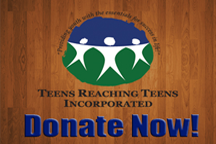By Evetta McGriff
April is Sexual Assault Awareness Month. The focus is to raise awareness about sexual assault and to help educate people on how to prevent sexual violence. Take an active role in your safety. Although it is impossible to eliminate the chance of something happening, there are strategies to help reduce the risk, as well as help prevent sexual assault. Sexual violence can happen to anyone. You have the opportunity to look out for you and your friends, speak up about sexual violence, and take steps to increase your personal safety.
April, May and June is considered Prom-season. Prom is a time for teenagers to have fun and create memories that will last a lifetime. You should be comfortable and not feel pressured to do something you wouldn’t normally do, or are not ready to do. Being pressured can be upsetting and scary. If someone tries to guilt or intimidates you, or the situation makes you uncomfortable, leave and find a trusted adult. It might be necessary to lie or make an excuse to getaway. Your safety is the most important thing. Rules are established for a reason and should be followed. Your parents and the school have rules and expectations for your behavior at the prom. Trust can be gained or lost with one action. Prepare a plan with your friends for a safe and fun prom night and make sure your parents know the plan. This includes making sure you have a ride home in the event of an emergency and what to do if you are in need of help. Be sure your parents know who you are attending prom with and have contact information.
Attend events that are safe, and stay away from unsupervised parties. Stay safe by going places with friends, and don’t put yourself intentionally in dangerous situations. Don’t accept a drink from anyone you don’t know. Do not walk away and leave your drink unattended. If you do, throw it away and get a new one. Trust your instincts. You don’t have to do anything you don’t want to do. You don’t need a “good reason” not to do something. If you are not interested, that is enough. Choose a code word that is known by you and your friends that is the signal that you need help, are in possible danger, or are uncomfortable. This allows you to communicate your feelings without letting the person who is making you feel that way know. Charge your cell phone, keep it with you, and have your charger on hand. Let your parents know if your plans change. Take extra money in case of emergency. Think of an escape route if you are in a situation that requires you to leave. Look for doors and windows, and try to locate others who may be of assistance in your escape.
You can also help keep your friends safe by learning ways to step in without putting you or your friends in danger. Create a distraction to give the person a chance to go to a safe place. Do not try to handle the situation alone. You may be more comfortable getting help from other friends. There is both safety and power in numbers. Find an adult to intervene in the situation.
If someone is pressuring you, or if something happens that you do not give consent to happen, know that it is not your fault. If you or someone you know is the victim of a sexual assault or contact the National Sexual Assault Hotline at 1-800-656-HOPE (4673). It is confidential and available 24 hours a day, 7 days a week.
Sources: National Sexual Violence Resource Center, RAINN (Rape, Abuse, and Incest National Network)



